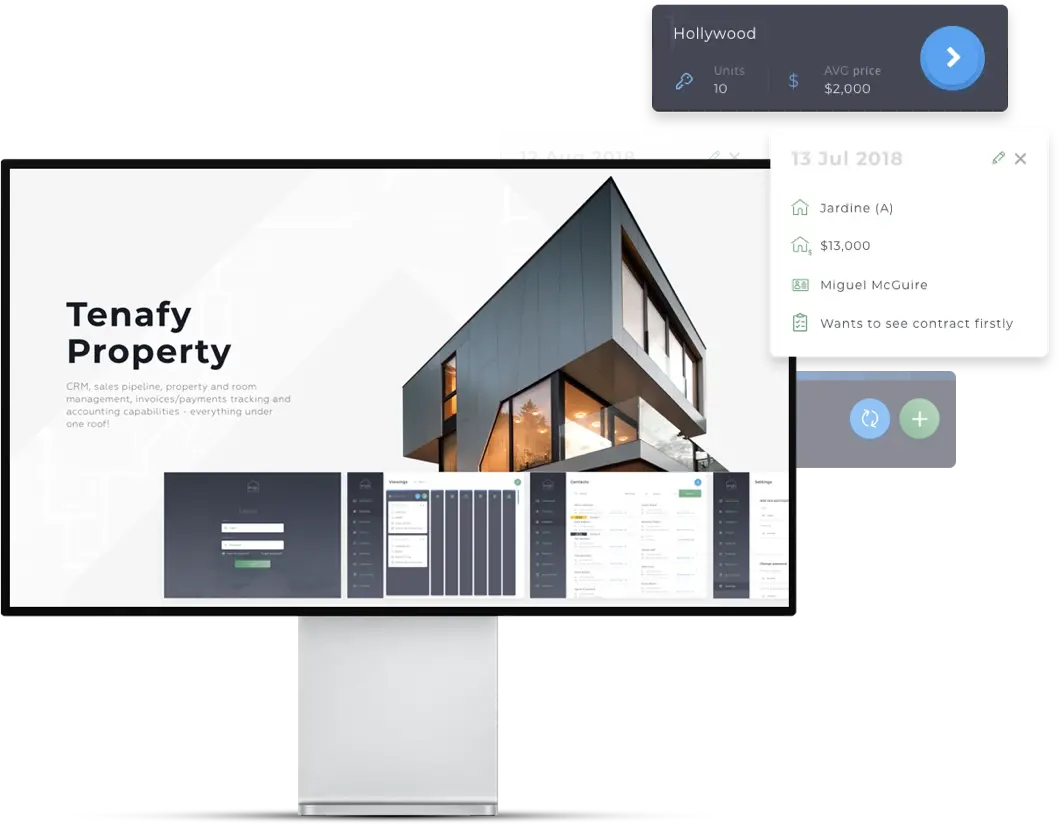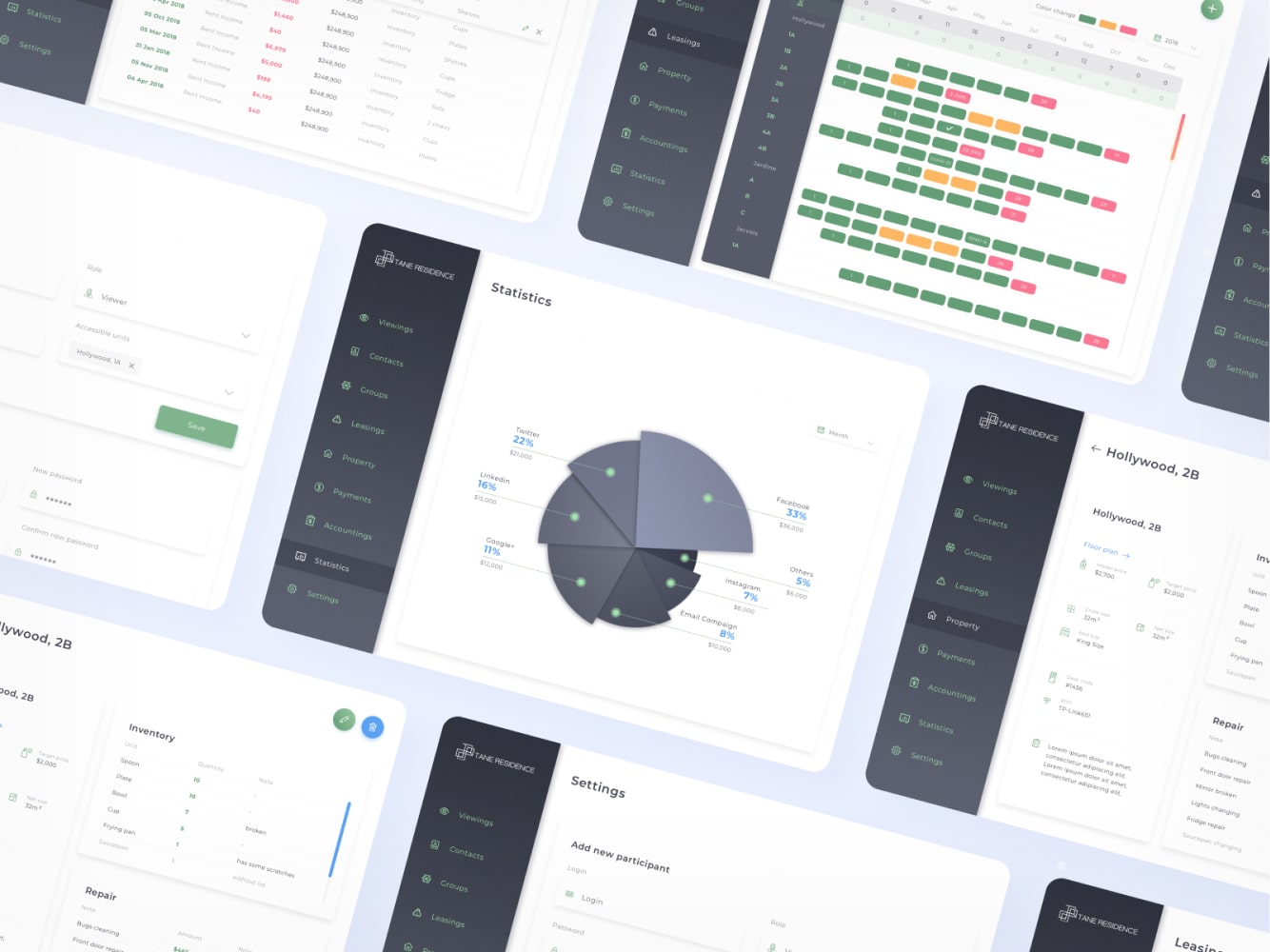The global real estate market remains an ever-flourishing business niche, growing steadily by 10% annually. And a huge part of it has long gone online for many relevant reasons. With too much demand to miss in the online servicing segment, real estate providers create elaborate websites to cover vast digital customer audiences.
Last year, at least 170 million people in the U.S. alone used specialized online services to pick and buy real estate. You certainly wouldn’t want to miss out on such tremendous outreach. But where do you start if you want to grab a piece of that pie?
First, you need to enter the arena with a bang. And for that, you need a proper online resource.
At Requestum, we build web solutions for companies big and small, operating across all relevant industries. Here’s our take on what essential options you have and how to make a real estate website an organic place of attraction for clients.
What Do You Need to Create a Real Estate Website?
Right off the bat, you should rest assured that a high-quality, competitive realty website is more than achievable if you a) do enough research, analysis, and preparation; b) have clear goals and project roadmap; and c) get workflow guidance and technical work done by seasoned specialists.
In the sections a little further below, we explore your major website implementation scenarios: either use a website builder with a readymade theme for minimized coding or go custom for more complex and personalized results.
Discover everything you need to know about IDX real estate website development
But if you are looking to face the task in all arms and with full dedication, there are a bunch of things you can prepare in advance while deciding on the best implementation route:
Buying a domain name
Getting a registered domain name is the first thing you can do single-handedly to sort of “get dibs” on a fitting website address and top-level domain (TLD). These can be purchased for a specific time period (usually up to ten years) and cost $3 to $30+ per year. At NameCheap or GoDaddy, you can pick from a variety of available options.
The website address usually duplicates the site/brand name, but you may involve a SEO specialist to come up with something more striking for a global search. As for the TLD, you have a bunch of options:
- Just use .com - originally short for commercial, it is the most common top-level domain, used universally by providers of any scale.
- Use a generic TLD - .inc (to emphasize a business stance or if you already have Inc. in the company name), .app (to emphasize a technological stance, if your business is based on a certain application, or if you provide software), or org. (to point out you are a large established organization).
- Use a country-code TLD (ccTLD) - .uk, .ca, .us, etc., to target a specific market and local demographics or emphasize your headquarters’ geography
Renting a hosting
A space on a well-protected, pre-configured physical server can be purchased to host a future website. The mentioned GoDaddy and NameCheap both offer hosting services along with domains, while other well-tried options also include A2 Hosting and Hostinger.
What you need to decide on here is the exact type of hosting - your options are:
- Shared hosting - a perfect solution for early-stage projects whose development destiny is yet to unravel (especially test builds and MVPs) - you get to host a site over a publicly shared server, which is the fastest available and affordable option;
- Framework-based hosting - if you decide to create a real estate website via a builder like WordPress, you get a range of supported hostings that offer more opportunities at a balanced price and can be overall better for starters;
- VPS hosting - getting a virtual private server is a popular alternative to setting up a whole dedicated server, which offers great capacities at a lower price and is a better fit for long-term projects;
- Dedicated hosting - setting up a website on its own dedicated hosting costs a penny and requires maintenance, but it is the ultimate option if you are looking for the highest website performance, sturdiest cybersecurity, and deepest flexibility
Deciding on the type of website
It is crucial to position your new resource based on its main purpose and format. Keep in mind - the digital real estate services niche is made out of several types of online resources you can go with, including:
- A property listings directory - the most basic realty resource is one that collects offers and descriptions of properties for sale or rent. For instance, you can create a real estate website that conveniently lists all properties and deals available in a certain region. Like a regular ads board, it would be more of an info portal;
- A real estate marketplace - you can go further and bridge the gap between property seekers and owners. A marketplace also lists available offers, but it additionally helps to connect with the owner, settle the deal specifics, and rent or purchase a property right on the platform. The biggest advantage of this approach is that you can lay the working space for other brands and providers, helping them generate clientele for fees and ad revenues;
- A realty agent’s website - a site can also be dedicated to the promotion and distribution of a real estate agent’s or agency’s services. A lightweight landing or a more bodied resource can be built to list services and descriptions, enable client-realtor communication, and provide other related features, like property comparisons, interactive maps, etc;
- A property management platform - dedicated platforms that tie up real estate administration, management, and maintenance in one handy place are demanded by providers of all shapes and sizes. For instance, you may build a platform with dashboards dedicated to individual properties, reflecting their real-time status updates, to keep everything under one thumb
Gathering requirements
The last but not least important thing you can do beforehand is structure your website development requirements. By now, you may or may not have registered the domain name, rented a hosting, defined the format of your website, and seen the big picture of what you are about to build. Document your decisions along with tech and business goals, available capacities (time and budget), desires, needs, and expectations.
Having requirements in place makes things so much easier, especially if you opt for custom development. At the same time, a custom development provider can help you shape and organize the requirements if you need expert input and don’t know how to kick off a project.
Picking the Best-Fitting Scenario
Described above is your ultimate “preliminary preparations package,” and it would certainly be nice to have all of that done early on before the full-on website development is kicked-off. But it all depends on which overall approach you go with.
All in all, you get two big website development scenarios to unravel based on the goals, requirements, and other underlying specifics of your project. Each dictates a varying pace, scope, and overall complexity of the website-building process for real estate.
Tenafy Case Study: Streamlining Property Management Digitally

Using a website builder
Using a specialized CMS with readymade website themes is the path of least resistance for many startups, entrepreneurs, and companies out there. All you need to do is switch a theme. Pick a design that fits you best from a vast library of templates of varying customizability. Configure it to your liking, fill it out with your content, and drag-drop your new website to completion.
It can be as simple as that, or you can dive deeper and exploit your chosen builder’s capacities to the max. Different solutions offer different tools and performance limitations. Your best bet is to pick one of the well-tried builders like:
- WordPress - especially suitable for your first-ever website, WP offers a wide range of themes and plugins, compatibility with all hosting platforms, and simple customizations. There is also handy analytics tools to let you track engagement and other online metrics, as well as scalability potential;
- Wix - no shortage of customizable templates, drag’n’drop functionality, and helpful SEO tools, especially with a premium plan;
- Squarespace - a reliable eCommerce store creator with tons of features, fancy designs, and trusty tech support that may as well serve as your one-stop website building solution;
- Weebly - a cost-efficient option that rewards an eager single-handed development approach and offers integrated analytics
These and other builders come in sufficient for hundreds of successful entrepreneurs and companies in the market. There is but one delicate moment to consider here.
The limits
Even with all the accessibility, cost-efficiency, and business versatility such builders offer, there is a major drawback - you cannot really set up a unique online platform with these tools only. At least not the one that translates your individual brand attributes and strengths.
Furthermore, third-party hosting providers can only grant you so much space and power. And, however flexible they may be, there are always certain limitations to themes, tools, and plugins offered by popular builders. If you want more - you pay more, but premium plans have limits, too.
Let’s craft the perfect software solution for your business
Going for custom development
To stand out in the crowd of eager real estate providers, you need an authentic digital platform. This calls for going beyond readymade themes, architecture wireframing shuffled at will, and generic UI/UX elements. A custom solution may not be one-of-a-kind, but it will still demonstrate the individuality of your business.
Custom means limitless. More than that, by turning to a team of developers for a personalized workflow, you can get directions and professional input on all the above-mentioned preliminary tasks.
For example, here’s what exactly a collaborative workflow at Requestum covers:
- Discovery phase. In order to lay the foundation and draw up a project roadmap that delivers consistent results, specialists first conduct a range of studies and analyses. These include business, market, and competitive research, target audience studies, requirements gathering, and further planning based on all that. SEO specialists can help you pick the most relevant domain name to hit higher search rankings. The final takeaway is an elaborate plan of tailored project approaches, tools, and milestones;
- Design and development. Based on all the planning, a team of designers creates an early architecture wireframe and a website prototype. This “carcass” is then enriched with visual and functional “meat” - color scheme, content outlines, UI/UX elements, interactive assets (buttons, clickables and dropdowns, etc.), and all the hardcoded and connected features. Necessary integrations are enabled for commercial and social media opportunities. And all implementations are directed by best practices and individual requirements only;
- Testing and QA. The assembled website is polished out via combined manual and automated testing approaches. Testing iterations are done until the best-optimized performance is achieved, while additional quality assurance makes it so across all target platforms (e.g., browsers, OS types, and mobile devices);
- Support and maintenance. A team of specialists behind the website’s creation helps properly deploy and launch it online. It is important to keep a newly-created site’s performance stable and load-resistant. For this, specialists also provide continuous tech support, doing regular bug fixes, installing timely updates, and watching security
As you can see, dedicated custom website development for real estate covers a large portion of necessary preliminaries. But which approach should ultimately fit you best?
Template-based vs custom
Different approaches fit different goals, ambitions, and technical constraints. When it comes to purely CMS-based vs custom, it is the choice between faster-cheaper-less and longer-pricier-more.
- CMS template. Using a CMS with a readymade theme means faster time-to-market, more costs saved, and a simpler overall website creation workflow. The result, however, can only come out equally simple and concise. Then, there’s the authenticity question - no matter how much you mix and shuffle the available elements, they still all come from a common pool. Dozens of other businesses may have used them in other sequences and patterns;
- Custom. Custom development may take longer, cost more, and be more complex all-around. But the result is more - more performance, more flexibility, and more potential profits. Developing a real estate website from scratch results in the original creation that truly resonates with the target clients thanks to the in-depth analysis and individualized workflow. On top of all that, you get directions and professional advice from dedicated specialists
Final choice
Pick a template-based development route for:
- basic landing or templated website creation without much extra stuff;
- low-code or no-code single-handed website development;
- fast development on a limited budget;
- website development for an entrepreneur, startup, or small up-and-coming business done single-handedly, by a freelancer, or by a small agency
Go for custom design and development for:
- uniquely designed, high-performance, targeted websites fully personalized to the brand;
- feature-rich platforms with optimized UX and competitive edge;
- professional consultations and directions, continuous post-release support and maintenance;
- website development for ambitious realtors and agencies of all scales by a dedicated team of professionals
Must-Have Features
One of the best things about working with an experienced team of developers is all the shared expertise and professional advice. To back it up, we might as well give you some features-related pro tips. For one thing, your future website must have the following features above all else.
Smart search
Users would like to find exactly the type of properties, owners, or conditions they need without much hassle. For this, make sure to equip the search bar with the auto-fill feature and offer as many filters as possible.
Interactive maps
To make everybody’s lives even simpler, enable an interactive map that helps find properties geographically in real time. That way, users will be able to simply look through vicinities and click on relevant options.
Social media integrations
It is paramount to enable social media sharing and contacts on the platform. On top of potential extra promotion for you, users also get to choose a more traditional way to communicate with owners.

Mobile-friendliness
Lastly, never miss out on mobile responsiveness. Make sure users can easily jump into your app and use all of its essential functionality whenever, wherever they are.
Bottom Line
No matter, really, which scenario you end up picking, making a real estate website shine in today’s digital arena calls for lots of experience, profiled skills, and the use of best practices. If you are unable to compensate for all that alone yet still need to establish a presence online, you need reliable specialists.
Consider Requestum as your trusty web development assistant. We create experiences that engage users, satisfy clients, and drive business organically. Looking to build a website similar to Zillow without going far? Let’s talk about your project.

Our team is dedicated to delivering high-quality services and achieving results that exceed clients' expectations. Let’s discuss how we can help your business succeed.



SHARE: